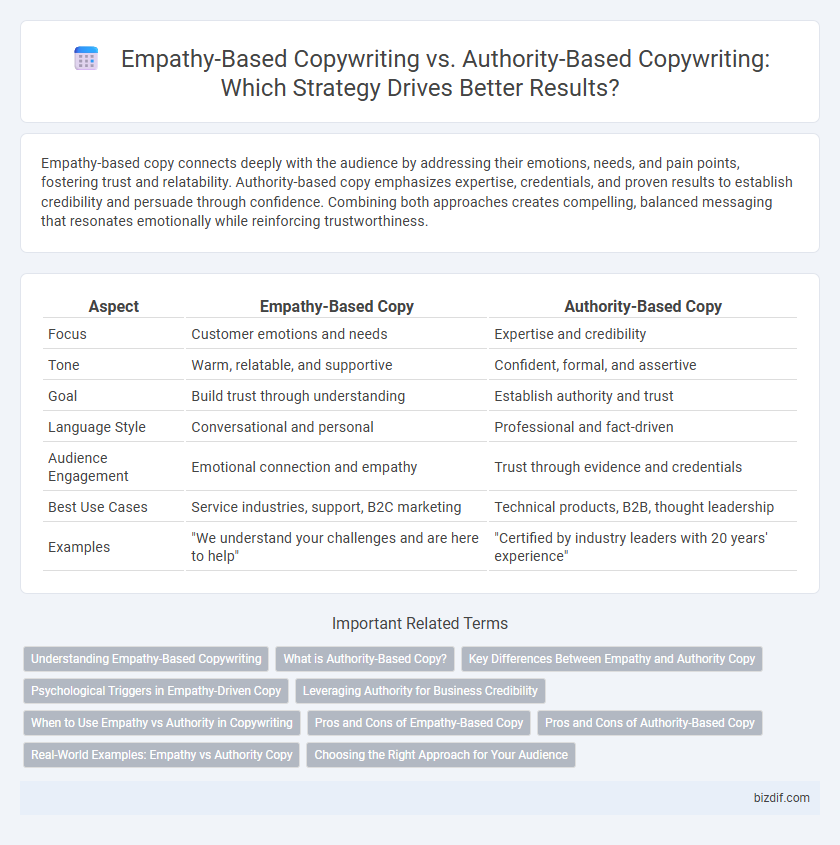Empathy-based copy connects deeply with the audience by addressing their emotions, needs, and pain points, fostering trust and relatability. Authority-based copy emphasizes expertise, credentials, and proven results to establish credibility and persuade through confidence. Combining both approaches creates compelling, balanced messaging that resonates emotionally while reinforcing trustworthiness.
Table of Comparison
| Aspect | Empathy-Based Copy | Authority-Based Copy |
|---|---|---|
| Focus | Customer emotions and needs | Expertise and credibility |
| Tone | Warm, relatable, and supportive | Confident, formal, and assertive |
| Goal | Build trust through understanding | Establish authority and trust |
| Language Style | Conversational and personal | Professional and fact-driven |
| Audience Engagement | Emotional connection and empathy | Trust through evidence and credentials |
| Best Use Cases | Service industries, support, B2C marketing | Technical products, B2B, thought leadership |
| Examples | "We understand your challenges and are here to help" | "Certified by industry leaders with 20 years' experience" |
Understanding Empathy-Based Copywriting
Empathy-based copywriting centers on deeply understanding the target audience's emotions, desires, and pain points to create a genuine connection that motivates action. This approach leverages psychological insights and emotional triggers to craft messages that resonate on a personal level, fostering trust and loyalty. By prioritizing the consumer's perspective, empathy-based copy achieves higher engagement and conversion rates compared to authority-based copy focused mainly on expertise and credentials.
What is Authority-Based Copy?
Authority-based copy establishes credibility by showcasing expertise, achievements, and trust signals such as awards, certifications, or endorsements from industry leaders. It leverages the writer's or brand's authoritative position to persuade the audience through confidence and proven results. This style is effective in building trust quickly when the target market values experience and credentials over emotional connection.
Key Differences Between Empathy and Authority Copy
Empathy-based copy centers on understanding the audience's emotions, pain points, and desires, fostering a personal connection that drives engagement. Authority-based copy emphasizes expertise, credibility, and trustworthiness by showcasing qualifications, experience, and proven results to persuade the reader. The key difference lies in empathy copy prioritizing emotional resonance, while authority copy highlights expertise and confidence to influence buying decisions.
Psychological Triggers in Empathy-Driven Copy
Empathy-based copy leverages psychological triggers such as emotional connection, validation, and trust to resonate deeply with the audience's feelings and experiences. By addressing pain points and demonstrating genuine understanding, this approach activates mirror neurons and fosters a sense of belonging, increasing engagement and conversion rates. In contrast to authority-based copy, empathy-driven messaging emphasizes relatability and emotional resonance, creating a powerful bond that motivates action through compassion rather than expertise alone.
Leveraging Authority for Business Credibility
Leveraging authority-based copy enhances business credibility by showcasing expertise, certifications, and industry accolades that build trust with the target audience. Highlighting authoritative voices, such as expert testimonials and case studies, reinforces brand reliability and persuasive power. Effective authority copy bolsters brand reputation, driving higher conversion rates by instilling confidence in potential customers.
When to Use Empathy vs Authority in Copywriting
Empathy-based copy excels in connecting with audiences during early customer journeys or when addressing sensitive topics, fostering trust and emotional resonance. Authority-based copy is crucial for industries demanding credibility, such as finance or healthcare, where expert validation drives conversions. Balancing empathy and authority enhances persuasive impact by aligning tone with the audience's needs and decision-making stage.
Pros and Cons of Empathy-Based Copy
Empathy-based copy strengthens emotional connections by addressing the audience's feelings and pain points, increasing engagement and trust. It can foster brand loyalty and encourage action through relatable messaging but may lack the persuasive impact of clear expertise and credibility. Overreliance on empathy risks appearing insincere or vague without concrete proof of product or service benefits.
Pros and Cons of Authority-Based Copy
Authority-based copy leverages the credibility and expertise of a brand or individual to build trust and influence decision-making, often resulting in higher perceived value and professionalism. However, it can sometimes come across as distant or unrelatable, potentially alienating audiences seeking personal connection or emotional resonance. While effective for establishing expertise, this approach may require careful balance to avoid appearing overly formal or detached from consumer needs.
Real-World Examples: Empathy vs Authority Copy
Empathy-based copy thrives in sectors like healthcare and non-profits, where understanding consumer emotions enhances engagement and trust, exemplified by charity campaigns highlighting personal stories. Authority-based copy excels in finance and legal industries, using expert credentials and data-driven claims to establish credibility, as seen in banking services promoting certifications and expert testimonials. Brands often blend both strategies, using empathy to connect emotionally while leveraging authority to reassure and validate their offerings.
Choosing the Right Approach for Your Audience
Empathy-based copy connects with audiences by addressing their emotions and personal experiences, fostering trust and relatability. Authority-based copy leverages expertise, credentials, and proven results to establish credibility and influence decision-making. Selecting the right approach depends on your target audience's preferences, where emotional engagement suits consumer-focused markets and authority appeals to professional or technical buyers.
Empathy-Based Copy vs Authority-Based Copy Infographic

 bizdif.com
bizdif.com